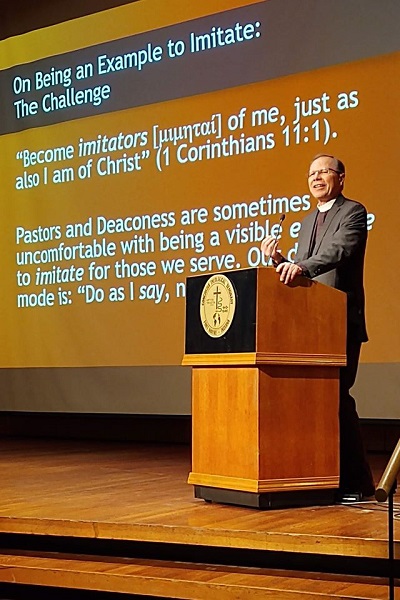A couple of weeks ago, Academic Dean Dr. Charles Gieschen held the Winter Quarter Collegial Conversation. The Collegial Conversations are mandatory quarterly convocations for all students, wherein either Dr. Rast or Dr. Gieschen speak on a topic that will affect these men and women when they enter the field. Afterwards, students meet with their faculty mentors over lunch for discussion questions.
This quarter’s topic was on being an example to imitate, a topic truly applicable for all Christians. As per Paul in 1 Corinthians 11:1: “Be imitators of me, as I am of Christ.” It’s also an excellent Advent theme, as this season is a time for preparation and self-reflection in light of sanctification. You can hear the theme in many of our Advent hymns, such as:
Before the dawning of the day
Let sin’s dark deeds be gone,
The sinful self be put away,
The new self now put on.
LSB 331:5, The Advent of Our King
Fling wide the portals of your heart;
Make it a temple set apart
From earthly use for heav’n’s employ,
Adorned with prayer and love and joy.
So shall your Sov’reign enter in
And new and nobler life begin.
To eternal praise and fame
We offer to Thy name.
LSB 340:4, Lift Up Your Heads, Ye Mighty Gates
So what is Paul calling upon Christians to imitate? His cruciform baptismal life! From a CTQ article by Dr. Gieschen:
“It is this cruciform life [of sacrificial servanthood], which is Paul’s through his baptismal union with Christ, that he calls Christians to imitate because they, too, have been crucified with Christ in baptism and remain in him and he in them. An absolutely vital aspect of Paul’s focus on imitation of his example is the understanding that imitation of Paul is really not imitation of his own person but is imitation of the new baptismal reality: Christ as the one who speaks and lives in Paul.”
(“Christian Identity in Pagan Thessalonica: The Imitation of Paul’s Cruciform Life,” which can be found at https://www.ctsfw.edu/…/Gieschen-ChristianIdentityInPaganTh….)
So why not just skip the middleman? Why did Paul put himself forward as an example to be imitated? Because:
- Jesus had ascended. The Christians that Paul is addressing only heard about a few years of Jesus’ life and could not see it lived out now in the flesh.
- These Christians had neither many other Christians around them nor a long history of Christianity to draw on concerning what a Christian life truly looked like.
And why is it still important that we—meaning all Christians, but especially pastors and deaconesses—put ourselves forward as examples to be imitated? For the same reasons:
- Jesus is still ascended and has not yet returned in glory.
- Christians—especially new Christians—are still surrounded by pagans. They benefit from seeing strong examples in their pastor and deaconess of one who is living a dedicated Christian life.
We see Christ’s life through the Gospels and we in turn serve our brothers and sisters in Christ – especially those new to the fold – with a concrete example of the Christian life. Dr. Gieschen explained how this played out in his own parish. As an example of marriage and chastity, he was faithful to his wife and always spoke positively about her; as an example of raising up children in the Lord, he and his wife brought them to church every Sunday; concern for the unchurched, visitors, and the needy demonstrated what it is like to have zeal for the lost; giving an offering served as an example of stewardship; and he exhibited hope and joy even in the midst of suffering and trial.
That said, are pastors and deaconesses expected to be more of an example to the Church than other Christians? In the words of the Rev. Dr. Jonathan Grothe, former Professor of Exegetical Theology at Concordia St. Louis:
“Yes and no. The same Christ is example to all, and the same paradigm of holiness and love is the goal for all. Nor is it really a matter of a ‘standard’ than one must ‘live up to,’ but rather a ‘pattern’ that one will ‘grow in to.’ Nevertheless, in human eyes the answer may have to be a ‘yes.’ For we must make, as well as we are able, evaluation of human conduct because, in God’s economy, the conduct of the pastor is paradigmatic of the life of Christ. Also, the consequences of the behavior of these men–whether they succeed or fail–are so far-reaching for the spiritual lives of others.”
Before dismissing students from the convocation for their lunchtime discussions on the topic, Dr. Gieschen finished on the following slide, before concluding with another hymn:
The Gospel is not only the power of God for salvation, but also the power of God for sanctification.
Sanctification is also the miraculous work of God. Christ’s role in our sanctification is not complete until our death or His return. He continues this work of sanctification daily as the one who is “the new man” living in us.
Ah, dearest Jesus, holy Child,
Prepare a bed, soft, undefiled,
A quiet chamber set apart
For You to dwell within my heart.
LSB 358:13, From Heaven Above to Earth I Come

